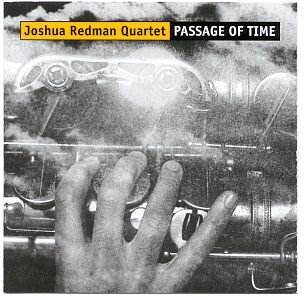JOSHUA REDMAN
Passage of
Time
 Warner Brothers
9362-47997-2
Warner Brothers
9362-47997-2
AmazonUK

Praise and success came young to Joshua Redman. After winning the 1991 Thelonious
Monk competition, he was seen as a leading figure of the group of young lions
emerging in that period. His early albums more than justified expectations,
combining boundless energy and enthusiasm with a mature confidence.
In recent years, (in common with several of his contemporaries, such as Roy
Hargrove) Redman has had to build upon that initial success and consolidate
it, something that never comes easy. While he has consistently produced highly
enjoyable albums, he has never quite matched the youthful joy of his eponymous
debut album or its successor, "Wish". And, in fairness, maybe he doesn't
want to. His sights now seem set elsewhere.
On this album, as on last year's "Beyond", Redman records with his regular
quartet, Aaron Goldberg on piano, Reuben Rogers on bass and Gregory Hutchinson
on drums, the first time he has retained an unchanged line-up for consecutive
albums. The foursome has the tightness of a working group. This is no blowing
session with a one-off studio band.
The music is an extended eight-part Redman composition, commissioned by SFJazz
and given its live debut on April 1st in San Francisco. The eight
parts run into one another, without a break, creating one long piece that
has ambitions (pretensions?) beyond those of much jazz. Redman is clearly
intent on establishing his credentials as a jazz composer. ("Beyond" also
consisted solely of Redman originals.) Although the piece never becomes greater
than the sum of its parts, it does contain some fine melodies and haunting
themes, notably Bronze and the closing theme, After.
Given the extended form of the music, and Redman's past exploits, it would
be easy to have unrealistically high expectations of this album. In the event,
the material provides an excellent showcase for the group. There is a
free-flowing, relaxed feeling to much of the music here, and it robustly
repays repeated listening. Redman's playing is as dominant and authoritative
as ever. Comparisons with Coltrane are somewhat wide of the mark - Redman's
solos rarely display Trane's relentless single-mindedness - but they are
an accurate indicator of his pedigree. Enemies Within provides a
particularly good opportunity for him to show what he is capable of, in a
fluid, driving solo.
Doubtless, a psychologist would have a field day with Redman's choice of
subject - time itself. (Is he mindful of his retreating youth?) On this showing,
he need have no fear; his mature years promise as much as the start of his
career. The album closes with a few seconds of studio chat, including an
engineer saying to the band "See you cats next year." Excellent news!
John Eyles